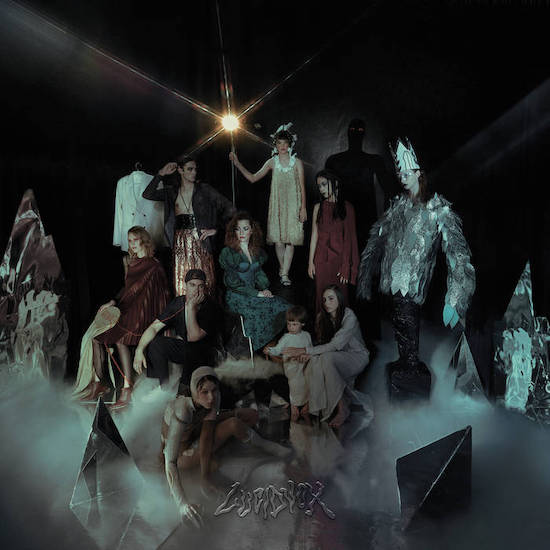Lucidvox is an intriguing proposition. On the face of it they are four women living in Moscow, who one day started a band from scratch, for a laugh. And now, after a couple of spirited and rambunctious EPs, they find themselves releasing their debut, We Are, on the groovy Glitterbeat Records. Their release, however, is no story of preconceived calculation, or music business mores. Rather it’s testament to the way life often happens; the chance elements that suddenly fall into place when even the actors themselves weren’t even aware of what was going on. And We Are is literally that, a record of four young rockers living in modern Russia and trying to make sense of it.
This is not to present the band as ingenues; as Muscovites they are inevitably, understandably, streetsmart. Some of the band are part of the crowd that has come to typify the Moscow branch of the “Pain Generation”, party-loving, nostalgic music fans forever chasing the next cultural thrill. But they are much more than scene heads. Like many young Russians I know, they are at once very hospitable and party loving and yet very reserved, or shy, not readily given to spilling the beans. Like many of their musical peers their songs deal with tough subjects they’ve become accustomed to since their early years, individual dramas that illuminate the shifting areas between society and state. Like so many other Russian acts (Shortparis, Inturist, Electroforez, Mirrored Lips, Glintshake) Lucidvox’s songs touch on what is considered acceptable in modern Russian society, whether privately or publicly. In doing this they throw a gloriously multicoloured musical trapeze between the opposite (personal) states of decision and uncertainty; heard best in single, ‘Knife’, a dark tale of domestic violence driven by a strange sonic glue made of raga guitar lines and some insistent, slightly jazzy drum patterns. Their music is also built in the way you’d imagine many things constructed in Russia; direct, even brutally blunt, yet invested with a considerable emotional hinterland.
Although We Are is recognisably, inescapably, Lucidvox to those who have been following them, this record marks a big step forward for the band. This is heard in the magnificent opener, ‘My Little Star’, a luxurious pagoda of a track that could be no-one else and is yet the sound of a band shedding its old creative skin. The seasoned listener will recognise a new sense of creative nous and understanding, of how musical dynamics can better reflect the emotions the bands want to parade. The same can be said for the single, ‘Runaway’ a hypnotic number that charts a family problem one of the band members had with the state. ‘Runaway’ has a patience and emotional punch I’d not previously noticed in their music. And it’s still a corking track, heavy on the chants and sinuous guitar lines. The band seems to have opened up, got heavier and yet more approachable in their music.
Now and again the party-head Lucidvox, the vodka-driven one that I first saw in a basement in Tallinn’s old town surfaces. The giddy rockers, ‘Body’ and ‘Knife’ are glorious flapper swirls; the sound of Amon Düül II meeting Souxsie Sioux for a quick fag between sets. But they are much tougher, more focused, squeezing out the drama for all they are worth. But with We Are – and unlike their previous EPs, which felt as if they’d been recorded on adrenaline – Lucidvox seem to be trying to nail a sound that can do much more than just get noticed in Moscow clubs like Agglomerat.
And – unlike their earlier, messier, incarnations – they’ve turned up the rock up to eleven. ‘Amok’ is such a simple song in many ways from a standard beat to repeat vocals to the Sabbath-lite guitar picks. It’s worth mentioning the Sabs, as you start to be nagged by the combination of those staccato guitar chops and the incessantly metallic beat. It’s audible, too, on tracks like ‘Around’ and ‘Sirin’, the mid-range guitars often drive a melody that the vague vocal incantations take elsewhere. Even if I feel the hot, declamatory breath of an Osbourne on my neck, I think some cuts on here betray heavy C21st Sabbath worship. Singer Alina’s flute adds a fair bit of 70s oomph for good measure.
This new approach, though, still feels as if it’s being transmitted through a set of codified and specifically Russian messages and gestures. Somehow, the band’s open dalliance with imagery also seeps into the listener’s consciousness. Lucidvox delight in dressing up, in creating and confounding Russian visual tropes and traditions. Tracks such as ‘You Are’ and ‘Around’ are brilliant in conjuring up this state; deliberately slow and secret plots that also function as imagery. Music operating as cinema for the inner eye. This record could (if you so wished) soundtrack the photographs of dancers enacting their poses for the opening performances of the Rites of Spring, or 1930s Soviet women painted by Aleksandr Deyneka. Or Bilibin’s glorious drawings of Slavic folklore, Kikimoras and Russalki scratched forever in ink on paper, threatening you with all sorts of trouble if only they could jump off the page. Take your pick. It wouldn’t really be a Lucidvox record if these elements didn’t play a part.
Lucidvox sounds like news from nowhere, a fair warning of awful things to come. But how sweetly they coat the message. Whether they have constructed it or not to this degree, their music has an apocalyptic, siren-like quality to it. Tracks like ‘Body’ and ‘Sever’ seem to catch a feeling as huge swathes of Siberia sink and burn. Whether they meant it to be is irrelevant, it is a simple fact their sound reflects the times. In that they are a curious example of a band who just exist as friends and who yet nevertheless manage to filter a disparate set of wider feelings through the maelstrom of their music.


